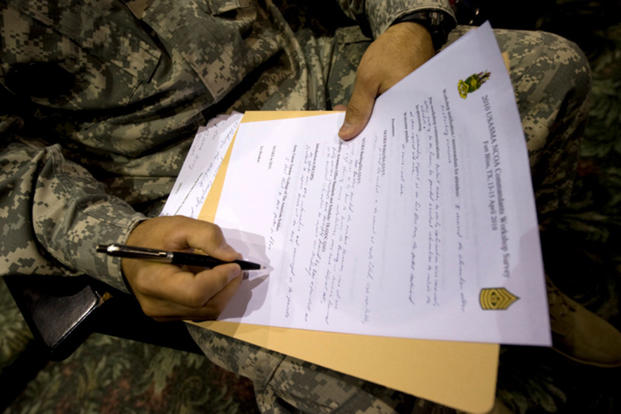U.S. Army Training and Doctrine Command's top enlisted soldier laid out a massive overhaul of non-commissioned officer education -- a plan that will make tougher leadership courses mandatory for promotion.
The effort will involve sweeping changes to the service's approach to developing the NCO ranks, from young sergeants to senior sergeants major. It will mean revising the programs of instruction for all leadership courses as well as new methods to ensure NCOs are making the right career choices to advance up the ranks, according to Training and Doctrine Command's Command Sgt. Maj. David Davenport.
The effort began last fall when the service renamed the Non-Commissioned Officer Education System to the Non-Commissioned Officer Professional Development System, Davenport said at a Feb. 17 Pentagon roundtable with defense reporters.
"The reason we did that is so the force can understand it's more than the education," he said. "It's the experiences that you get doing various jobs; it's about stepping outside of your comfort zone taking on a broadening assignment, ranging from drill sergeant to recruiter to working with industry. It's changing the entire system."
The Army's endeavor comes on the heels of a similar effort in the Defense Department. In November, Defense Secretary Ashton Carter unveiled a comprehensive "Force of the Future" personnel and management overhaul. Carter's goal for the "Force of The Future" plan is to make the Pentagon and the services function more like businesses.
But the Army's effort is the result of one of the most extensive polling efforts in the service's history. The online NCO 2020 survey gathered responses from 400,000 soldiers on the current education system.
One of the biggest changes to come out of the effort is a new policy known as STEP for Select, Train, Evaluate and Promote.
The policy went into effect Jan. 1 and is the "new way we are going to make sure soldiers, NCOs have certified in their core competencies for promotion," Davenport said.
Last year, the Army had backlog of about 14,000 NCOs that had been promoted to various grades in the intelligence corps that had not received formal military education, Davenport said.
In that number, "we had about 4,000 that had been in grade three or more years," he said. About 1,200 of those soldiers had been deferred six or more times from attending school, Davenport said.
By the end of last year, the Army has reduced that backlog by 2,287, he said.
"It's a small reduction … but more importantly, the message is getting out that STEP is important and if you want to get promoted you have got to get into the school house," Davenport said.
Another result of the NCO education overhaul is the new Master Leaders Course, a 17-day course for sergeants first class being promoted to master sergeant.
"We just finished up the second iteration of the pilot. We will begin the third and final pilot next month in March, so it begins a program of record for the Army beginning FY 2017," Davenport said.
So far, National Guard soldiers have done one pilot of the Master Leaders Course and Reserve soldiers have gone through the second pilot. Active soldiers will go through the final pilot, he said.
"We have gotten great feedback; the solders like the rigor behind it," he said. "It requires more prep time before you come into the class room … you really need to prepare."
The Army is developing what's known as structured self-development, a distance learning module for every professional military education class to help soldiers prepare, he said.
"They also like the process of reflective time," Davenport said. "We have made sure that we are just not trying to give them so much to memorize for a test -- to actually get time to absorb the material, and we come back together to make sure they have retained it and then we test them."
The Master Leaders Course is not like the old First Sergeant Course at Fort Bliss, Texas, Davenport maintains.
"It's much more than that; we are helping them to transition from that tactical level to that to the operational level, and we are actually exposing them to some strategic level thought," he said.
Army officials are also looking at how grades are given in these courses, Davenport said.
"We are retooling, reshaping the information" on the … DA Form 1059 or Academic Evaluation Report, the form soldiers receive when they complete a course, he said.
Factors such as grade-point averages and how students performed on writing assignments will be evaluated, he said. The form will also provide room for the instructor to write about competency and attributes of the student while they were in the course," Davenport said.
Army officials are also developing a Career Map that NCOs can use to help them make the right choices at the right times in their career, he said.
"Every soldier will know of those opportunities once we get the career map developed," Davenport said. "We are going to roll it into a system called Army Career Tracker. That soldier can click on their particular MOS and see the career map -- roll the mouse or touch the screen -- and see the prerequisite to get that opportunity," such as working with industry or academic fellowships.
The sergeant major is scheduled to discuss the "revolutionary" changes in the new NCO education strategy with soldiers at a March 3 town hall meeting.
"We are not just doing a little bit at a time, we are really trying to affect a massive change, so it's important that we talk to our soldiers and they understand the direction we are heading," he said.
--Matthew Cox can be reached at matthew.cox@military.com.





























